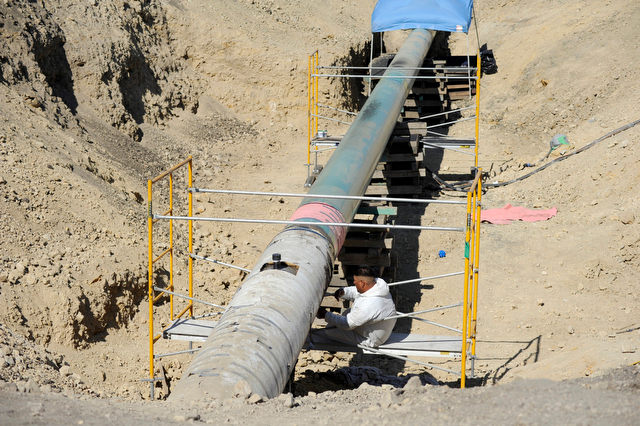
Federal regulators with Pipeline and Hazardous Materials Safety Administration (PHMSA) ordered on Thursday that Plains All American Pipeline purge Line 903 — the 130-mile pipeline that runs from the Gaviota Station to a Kern County facility — which has been idled while filled with viscous crude since it was ordered to shut down nine days after Line 901 ruptured on May 19. The purge could begin as early as late next week and must commence during early daylight hours.
It’s unclear why the federal order has been issued now, especially with weather forecasters predicting rain in the near future. The order prohibits Plains from restarting Line 903 until authorized by PHMSA.
To purge the pipeline, regulators will use water or natural gas to push through the unprocessed crude, which contains water that has likely been corroding the pipe interior for months. According to a PHMSA field investigation earlier this year, the actual length and width of the wear in the pipeline, or anomalies, were greater than the measurements predicted by smart pig inspections of the line. According to the corrective action order (CAO), Plains failed to provide the third-party inspector (also known as “pig vendors”) with field data from direct investigation and measurements. Plains has not disclosed who the third-party vendor was.
PHMSA’s independent review of inspection results from the past decade found that Line 903 — particularly the Gaviota to Sisquoc segment — had similar corrosion as Line 901. Specifically, Line 903 has larger areas of external corrosion, the report stated. In addition, PHMSA reported Plains does not appear to have an effective corrosion control program and that the pipeline probably eroded since the last inspection toll survey that was completed in early May of this year.
In response to the federal order, Plains issued this statement: “While we do not agree with several of PHMSA’s additional findings, Plains personnel have already engaged with PHMSA in planning the purge of Line 903 between Gaviota and Pentland. As called for in the CAO, Plains will complete the activities in coordination with and under oversight from PHMSA as quickly and safely as possible.”
Plains also must submit a plan to federal regulators that identifies and remedies any anomalies on Line 903 that are similar to the broken pipeline. It also must turn over field data to the third-party inspector and request a reevaluation of the smart pig results.
Federal regulators are planning to meet with county Planning & Development staff next Thursday to discuss the order. Representative Lois Capps, who helped arrange the meeting, said in a statement she was pleased PHMSA was taking precautions to prevent another spill. “The Corrective Action Order amendment’s inclusion of Line 903 is an important step to ensure that all necessary repairs are in place before this pipeline service is restored,” she said. “Transporting oil is inherently risky, and we must do all that we can to ensure that, if we are going to continue transporting oil, it is done with the utmost care and caution.”
Check back for updates to this story.



